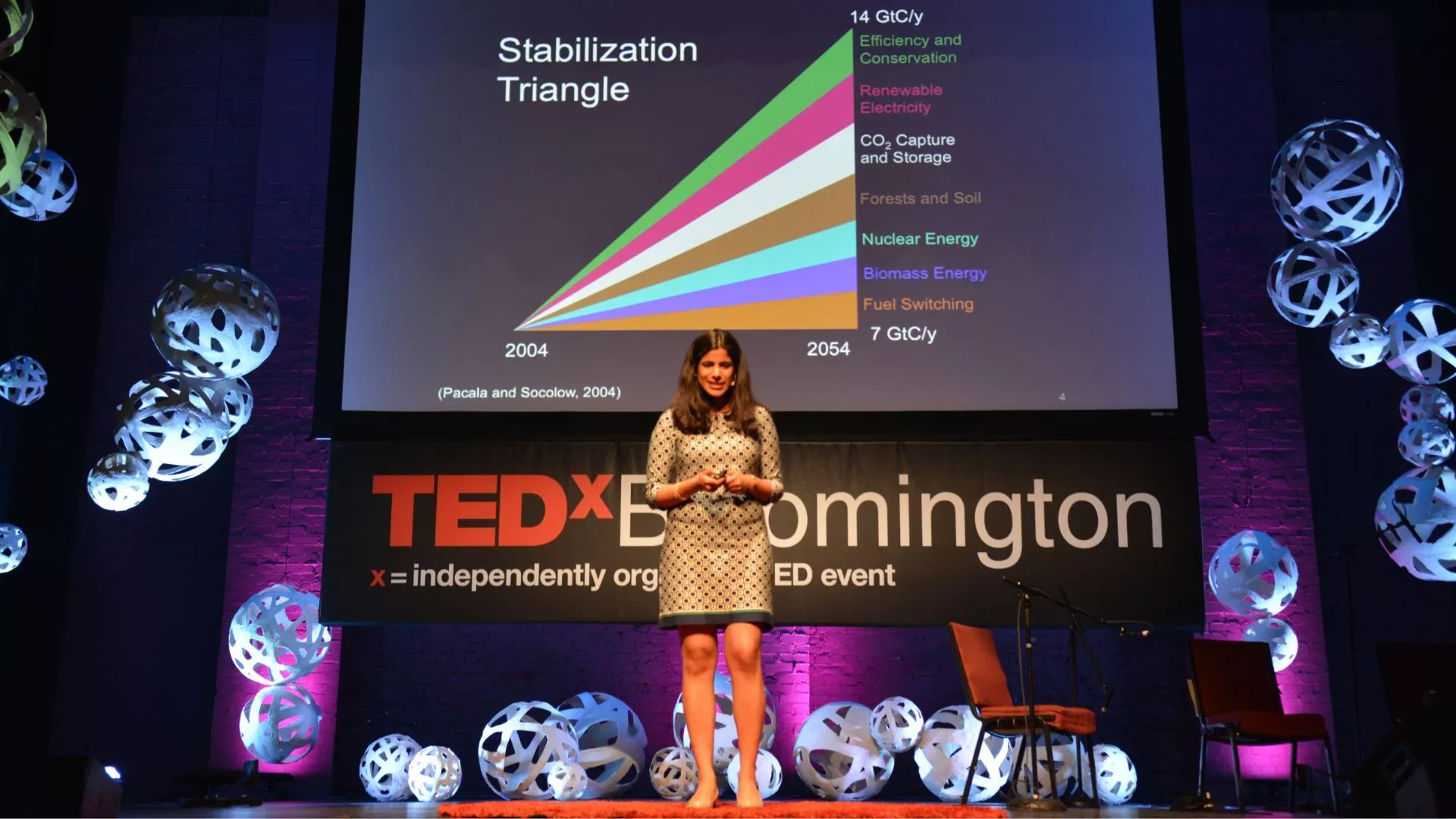What are the biases that shape people’s judgments and decisions about use of resources and systems, especially energy and water? Shahzeen Z. Attari of Indiana University explores this topic in her research.
November 2018

Shahzeen Z. Attari delivers a talk on climate change and energy conservation at TEDxBloomington. (Photograph courtesy Indiana University Bloomington)
Shahzeen Z. Attari, an associate professor at the Paul H. O’Neill School of Public and Environmental Affairs at Indiana University Bloomington, explores the intersection of cognitive and environmental sciences through her teaching and research. Her interests are reflected in her work on human behavior and resource use. Attari’s work has been published in various journals, including Judgment and Decision Making, Global Environmental Change, and Proceedings of the National Academy of Sciences. Her research has also been featured in The New York Times and The Economist.
Attari was recently named a 2018 Andrew Carnegie Fellow, a distinguished honor given to scholars, journalists, public intellectuals and authors who excel in the fields of science, law, technology, business and public policy. She was chosen for her project titled, “Motivating Climate Change Solutions by Fusing Facts and Feelings.” Each fellow receives up to $200,000 (Rs. 148 lakhs approximately) for their research and writing. Attari is also involved in the Prepared for Environmental Change initiative of Indiana University.
Excerpts from an interview.
What are the most significant environmental concerns of today?
We face many environmental problems, but climate change is one of the biggest and most challenging ones. Climate change will accelerate and exacerbate many other environmental and social problems. This doesn’t just mean our weather will get warmer, it also means we will need to deal with more extreme weather events, sea level rise, heat waves, species extinction, ocean acidification, wildfires and many more impacts.
How do people, at an individual level, approach environmental concerns?
Individuals approach environmental problems in a variety of ways. Many people who believe climate change is a problem may not know what they can do about it or they may think that their behavior is only a drop in the ocean and will not lead to a significant change. We need to identify ways through which these drops start adding up and motivate people to change their behavior and vote for policies that can make a difference in how we use energy and protect the environment. We also need a price on carbon dioxide, so we can account for the pollutants, and start systematically decreasing our emissions to zero.
Please tell us about the field of environmental and cognitive science.
This is a growing field in research and academia, but has been around for a few decades, with leaders in the field coming from psychology, sociology, anthropology, cognitive science and economics backgrounds. The research questions we ask and answer in this area are very interdisciplinary. The ones I have focused on in my career include: How do people perceive how much energy and water different appliances use? How do people understand how the water system works? How do we motivate behavior change? And, how do people prefer to change their behavior?
You were recently named an Andrew Carnegie Fellow. What are your research project aims?
As an Andrew Carnegie Fellow, I aim to identify key solutions to motivate action on climate change through three research challenges. I plan to:
How do you see the role of women evolving in the sciences?
We need true gender equality in the sciences and academia, and we are far away from it. This is caused by a variety of complex factors that we need to address as a society. We are starting to see some changes, but a lot of work remains to be done for there to be equality at the top. In my perspective, both women and men need mentorship on how to bring about this change—starting from not penalizing women who have children and allowing women to speak and be heard to calling out aggression against women in research and science.
I have been blessed with some amazing male and female mentors in my life, who have nurtured me when I was a college student all the way to being a professor. I have also been blessed with an amazing family, which has supported my decision to pursue research and academia, even though my pursuit went against cultural norms. Having parents who nurture their children’s curiosity when they are young is so important. I owe my success to them.
Natasa Milas is a freelance writer based in New York City.
COMMENTS